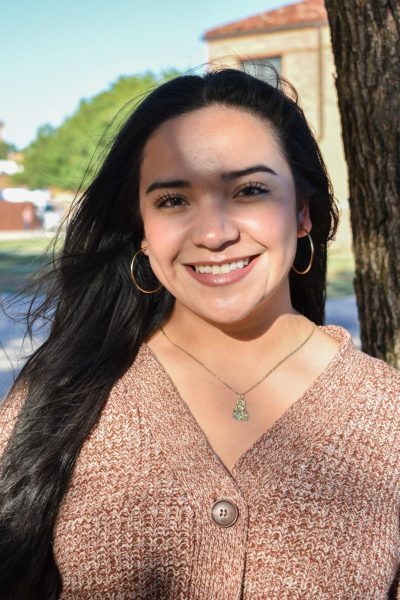
Mariana Vela poses for a photo, Oct. 11. (Sam Difiore)
Mariana Vela remembers a red van and crying for her mother. She was only two years old when she came to the United States. But now, she has to fight for her right to be here, in the only home she has ever known.
Vela, a mass communication senior, is one of about 578,780 beneficiaries of DACA, or “Deferred Action for Childhood Arrivals.” DACA is an immigration policy that allows some people to receive a renewable two-year period of deferred action from deportation and be eligible for an employment authorization document after being brought to the United States as children.
“I pay taxes like all Americans,” Vela said, “It’s not an easy thing to get.”
To be considered eligible for DACA, there are several requirements. Along with being under a certain age both now and when they entered the country, applicants must be graduated, enrolled in school or honorably discharged from the U.S. military. They also cannot have been convicted of a felony, significant misdemeanor, multiple misdemeanor offenses, or otherwise pose a threat to public safety or national security. If they encounter any legal trouble, they risk their DACA being rescinded and the threat of deportation.
In addition to the many criteria they must meet, applicants also have to pay a hefty fee, with renewal costing as much as $495 this year. That is without seeking legal counsel to ensure the paperwork is correctly filed.
“We are not all criminals,” Vela said, “We’re not just here to reproduce and take advantage of the benefits.”
Vela received her social security number and eligibility to apply for her driver’s license when she was seventeen. She has since held several jobs, worked toward her degree, and has even been promoted into a supervisor position at Lowe’s. She is a daughter, a classmate, a coworker, a friend, but still, she said she lives with fear.
Vela was in her first semester of college when DACA was first rescinded. She said she remembers the day as if it were yesterday, anxiously awaiting the results of the hearing.
“I pulled up Twitter because I thought ‘Oh I need to know what is going on’ and it was all over my feed that DACA had been rescinded and that these were the next steps.” She later said, “I started crying and I had to run to the bathroom because my first thought was my parents. Their sacrifices coming to America were just ripped away. They gave up everything to give us everything, or even just a small part of something.”
While that rescission did not stay, multiple appeals and lawsuits since then have called for ending DACA. Each one brings a little more fear into the lives of the people receiving it and those who know and care for them. On Sept. 13 of this year, a federal judge in the Southern District of Texas ruled DACA unlawful, new rulings hardly come as a surprise to Vela.
“I just want to finish my degree at this point,” Vela said, adding that she would eventually seek citizenship; “But that comes with its own set of complications,” she explained. “I am just happy I get to live a semi-normal life, unlike so many undocumented people who have to live in the shadows.”
While MSU does not offer such a program, universities across the country, including the University of California, Berkeley, Arizona State University, Florida Atlantic University and Ohio State University are offering resources and training to students interested in being an ally to DACA recipients. Resources can be found online for anyone interested in learning how to support these classmates.




















